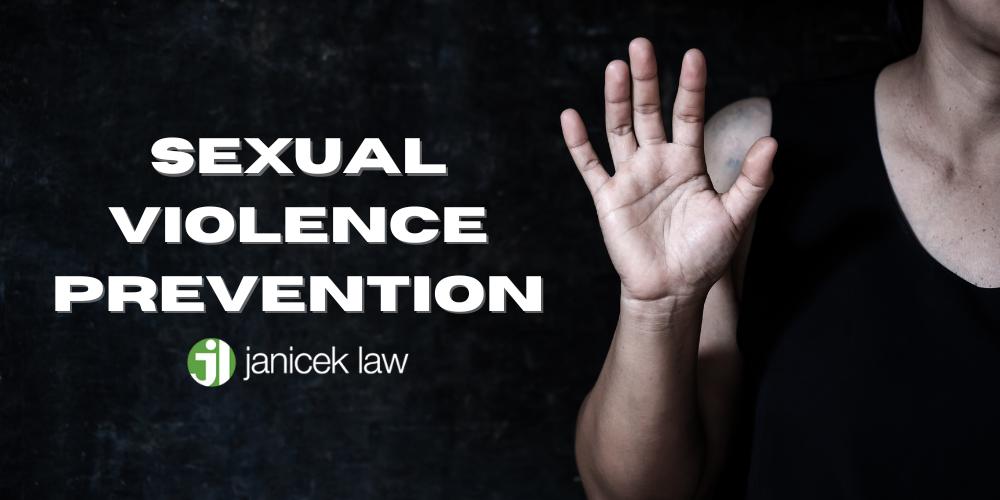Tragically, thousands of American women and men suffer from sexual abuse every year. There is no easy fix for this problem, but there are reasonable steps that we can all take to educate and protect each other from all forms of sexual abuse, including rape, molestation, and even sexual harassment. Below, we break down sexual violence prevention tactics that we can all implement into our daily lives.
If you or someone you love has endured sexual abuse, you may have grounds to file a civil lawsuit in the state of Texas. Call San Antonio sexual abuse lawyers today at 210-366-4949 to schedule a free consultation.
What is Sexual Violence?
Sexual violence (or sexual abuse) occurs when someone engages in physical conduct of a sexual nature without consent from the victim. Sexual violence is very common in the United States, with more than 50% of American women and nearly 1 in 3 American men enduring non-consensual sexual contact throughout their lifetimes. Many people believe that sexual abuse is just rape (forced penetration of any object or body part in the mouth, anus, or vagina), but it isn’t. Sexual abuse can also include:
- Indecent exposure, which is when a person intentionally shows their genitals to someone else without their consent.
- Taking, distributing, or showing sexual pictures/videos without someone’s consent.
- Any kind of unwanted sexual contact including molestation, groping, and fondling.
- Incest, which is any sexual behavior that occurs between family members.
- Forcing a victim to perform sex acts upon the perpetrator.
- Engaging in any kind of sexual activity with a minor (the age of consent is age 16 to 18 in certain states).
- Engaging in any kind of sexual activity while the victim is intoxicated, asleep, or unconscious.
- Sexual harassment, which includes any unwanted sexual encounters or activity (often within the workplace).
- Stealthing, which occurs when a sexual partner removes their condom during intercourse without the victim’s knowledge or consent.
- Knowingly transmitting an STD to a sexual partner without their knowledge or consent.
- Voyeurism, which occurs when a person watches someone else in their home or hotel room without their consent in order to receive sexual pleasure. Voyeurists commonly do this by placing hidden cameras throughout a person’s home or room.
Unfortunately, most cases (93%) of sexual abuse are committed by people that victims already know, such as friends, family members, coworkers, neighbors, employers, and even romantic partners. But it can also occur between strangers, as well as online through phones or social media.
Sexual abuse is a widespread problem that affects the life, health, and overall well-being of victims for the rest of their lives. 94% of women who are raped begin experiencing symptoms of post-traumatic stress disorder within 2 weeks of their attack. Other victims may suffer from STDs, fertility issues, gastrointestinal issues, sleep disorders, eating disorders, substance abuse and addiction, suicidal thoughts and desires, etc.
This means that most victims will spend their lives going in and out of therapy and their doctor’s office in order to cope and heal from their attacks. Frequent mental and physical healthcare is incredibly expensive in the United States, with an approximate lifetime cost of rape sitting around $122,461 per victim according to the CDC.
Sexual Violence Prevention
Sexual violence and sexual harassment prevention is key for the lifelong wellbeing of both women and men. There are plenty of warning signs of sexual abuse that we can look out for and therefore engage in preventative measures. There are also reasonable steps we can all take to educate each other and keep each other safe.
Below, we discuss several preventative measures for sexual abuse that everyone should keep in mind.
What is Consent and What Does it Look Like?
You know the saying: knowledge is power. When it comes to sexual abuse prevention, knowledge is also safety. Unfortunately, many children and teens are not taught about the basics of consent: what it is, what it looks like, and what it sounds like. Knowing the basics of consent can quite literally save lives.
So – what is consent in the context of sexual activity? It’s a clearly and freely communicated agreement between partners about whether or not they can proceed with sexual behaviors. Consent can include both verbal and physical communication between partners. Consent is crucial for not only safety during sexual activity, but for knowing the boundaries, likes, and dislikes of each partner.
A few indicators of consent can include nodding, prolonged eye contact, and smiling, but these indicators are not full consent in and of themselves. It’s important for partners to engage in verbal communication about whether it’s okay to proceed with each step of sexual activity. Some people may not want to go past a certain point, so partners should check in with each other throughout sexual activity to make sure they still have consent. If one partner decides to withdraw consent (which is okay to do), the partner must respect that. If they don’t, they are committing sexual abuse.
You cannot consent to sexual activity if you’re intoxicated, unconscious, asleep, or under the legal age of consent. Consent that is given right after threats, pressure, intimidation, or manipulation is not actually consent. That’s because consent in these scenarios is not given freely. Lastly – consent cannot be freely given in sexual situations where there is a clear power imbalance. Some examples of power imbalances include sexual activities between family members, therapists and clients, doctors and patients, teachers and students, and supervisors and employees.
In short: not giving consent clearly or freely during any step of sexual activity is considered sexual abuse.
How to Respond if Someone is Pressuring You Into Sexual Activity
Pressuring someone into sexual activity is unfortunately very common. Remember, though, giving consent after being pressured, intimidated, threatened, or manipulated is not consent, because it’s not freely given. You do not have to do anything you don’t want to do ever, especially if you feel unsafe. But when you’re being pressured or intimidated, you can easily enter fight, flight, or freeze mode and not know how to safely escape the situation.
Listed below are some possible escape tactics that you can use.
- Use Code Words With Loved Ones: If you’re being pressured into sexual activity and you need help from your loved ones, code words can come in handy. Basically, saying anything to your loved ones that secretly means “I need help” can help you safely and smoothly escape the situation. You could text a short series of numbers, say something like “I want to go to Hawaii this summer,” or even make a specific hand sign. That way your loved one can swoop in and help you get out of the situation.
- Lie: In situations where you’re being pressured into engaging in sexual behaviors, you can lie. As children, we were all taught that lying is bad, and that we should never do it. This is definitely true most of the time. But if you feel unsafe, that rule needs to be thrown out the window. Lie and say that you need to go to the bathroom, that you have to meet your friend for dinner in a few minutes, or that your sibling just texted you needing a ride home from school.
- Come Up With an Escape Plan: If you’re quite literally backed into a corner, look for ways to escape if you need to. Are there doors or windows nearby? Are there people nearby you, and if so, is there a way you could get their attention? Do you have pepper spray in your purse or on your keychain? Do you have your phone in your pocket?
At the end of the day, please remember that it’s not your fault that someone else is making you uncomfortable. You did not ask for this in any way, and this person is in control of their own actions.

Safety in the Workplace
Sexual harassment in the workplace occurs when employers or employees engage in nonconsensual sexual conduct that creates a hostile or offensive environment. Subtle forms of sexual harassment can include:
- Frequent sexually explicit jokes between employer and employee.
- Unwanted physical contact such as hand holding, pinching, hugging, placing a hand on the lower back, etc.
- Asking for or implying that sexual favors are necessary in order to keep a job or obtain work benefits.
- Making discriminatory remarks about someone’s sexual orientation.
- Using demeaning or sexist terms in reference to women in the workplace.
Even the most subtle forms of sexual harassment within a work environment are enough to make someone feel uncomfortable and unsafe.
Sexual harassment committed within the workplace can easily lead to full-blown sexual abuse, and therefore, it should not be tolerated. That’s why it’s so important for all managers to work towards a harassment-free workplace. Listed below are a few ways that employers can prevent sexual harassment on a daily basis.
- Implement a Strict Anti-Harassment Policy that clearly defines what sexual harassment is, clearly lists punishments for sexual harassment, lists a procedure for filling out sexual harassment claims, and states that retaliation after sexual harassment claims will not be tolerated.
- Hold Annual Training Sessions for Employees: During these sexual harassment prevention training sessions, you should define sexual harassment, go over sexual harassment claim procedures, and encourage employees to come forward any time they feel unsafe or uncomfortable. Be sure that employees understand that sexual harassment will not be tolerated, and that they deserve to feel safe and comfortable in their work environment.
- Hold Annual Training Sessions for Supervisors and Managers: During these sessions, you should discuss what sexual harassment is and explain how to properly handle complaints if someone is sexually harassed. Having educated employees and managers can go a long way in preventing sexual harassment in the workplace.
In order to prevent sexual harassment in the workplace after these training sessions, both employers and staff members should look out for warning signs that harassment is occurring. Additionally, employers should take all incidents of sexual harassment seriously in order to prevent it from happening again.
Safety While Drinking
The risk of sexual abuse occurring can go up in situations involving alcohol, such as parties. Alcohol can alter someone’s sense of judgment, speech, and control, making it easier for abusers to overpower victims. Additionally, parties and social settings present an excellent opportunity for abusers to spike drinks with “date rape drugs” such as rohypnol. So if you’re planning on going out to party, it’s important to have a safety plan in place.
- Monitor Your Friends: It’s always a good idea to go to a party or a bar with a couple of friends that you trust. That way, you can all take an active role in looking out for each other. Make sure that you all make a plan to arrive together and leave together. If someone wants to leave the party early, they should immediately tell their group of friends. If one of your friends looks like they’re in an uncomfortable situation, step in and help them get out of it.
- Create a Backup Plan: Party plans can definitely change on a whim. Make sure you have a backup plan to get home, whether that be through another trustworthy friend, a taxi, or a rideshare service. Make sure you have cash and a charged phone on hand so that you can do what you need to do to stay safe and get home.
- Only Drink What’s Familiar: Large parties are not the best places to try out new drinks. You may not recognize every single ingredient in the drink, and you may not know how strong it is or how it will affect your body. A few unfamiliar drinks can lead to you feeling sick, dazed, and out of control, which is not ideal for safe partying.
- Keep an Eye on Your Drink At All Times: Keep your drink in your hand or within your line of vision. If you need to go to the bathroom or to the dance floor, ask a trustworthy friend to hold your drink or take it with you. Leaving a drink unattended provides a great opportunity for someone to spike it with drugs.
- Don’t Accept Drinks From Strangers: As a general rule of thumb, you should not accept a drink from anyone but a trustworthy friend or the bartender. Again, you never know who may be trying to give you the date rape drug.
- Check in With Your Body: Do you feel too intoxicated or out of control? If so, don’t accept any more drinks. Ask your friend for water or for a safe ride home.
- Call 911: If you believe that you or someone in your friend group has been drugged at a party, call 911 or get a ride to the nearest hospital. The healthcare professionals will run specific tests to determine which drug(s) have been ingested.
Safety While Traveling
Traveling presents its own set of potential dangers, especially for women. Listed below are some basic tips and strategies for sexual violence prevention while in a new place.
- Share all of your travel information (flight numbers, addresses, phone numbers, itineraries, etc.) with a close friend or family member so they can keep track of you and call for help if you never make it to your destination.
- Research any taxis, buses, trains, or ridesharing companies that you may need to use at the new destination.
- Locate the nearest hospitals and police stations so you can use them if you need to.
- Keep track of everything you drink at parties or bars.
- Be slow to immediately trust new people, especially with your drinks and transportation.
- Create backup plans for potential unsafe situations. Look for doors, windows, hospitals, police stations, and bystanders. Keep your phone on you, and maybe even some pepper spray. Make sure you have the phone numbers of the people you trust.
Can You Sue for Sexual Abuse in Texas?
Yes, you can definitely sue for sexual abuse in Texas, especially if your physical and emotional wellbeing has suffered significantly since the abuse. In fact, Texas recently extended its statute of limitations for civil sexual abuse claims. In other words, victims now have more time to file sexual abuse claims than they did previously.
According to Texas law (HB 3809), victims of child sexual abuse now have 30 years from their 18th birthday to file civil sexual abuse claims. The statute of limitations for criminal sexual abuse claims in Texas depends on the specifics of the abuse incident. Be sure to speak with an experienced sexual abuse lawyer to determine whether you still have grounds to sue.
Damages for Sexual Abuse
San Antonio sexual abuse lawyers at Janicek Law can help victims recover financial compensation for the following types of damages:
- Past and future medical expenses if you suffer from physical health issues related to your sexual trauma.
- Medical expenses associated with a psych ward hospitalization.
- Physical pain and suffering.
- Emotional distress and mental health disorders.
- Mental health counseling expenses.
- Lost wages if your sexual trauma has caused you to miss work.
- Loss of earning capacity if your sexual trauma/mental disorders prevent you from accomplishing all your job duties.
- Loss of consortium if your sexual trauma prevents you from having a normal, healthy relationship with your partner/spouse.

Call San Antonio Sexual Abuse Lawyers at Janicek Law Today
If you or someone you love has suffered from sexual abuse form a therapist, a teacher, a clergy member, or a Boy Scout leader, you may have grounds to file a civil lawsuit in the state of Texas. The legal team at Janicek Law has decades of combined experience in handling all sorts of civil cases. We can support you, defend your legal rights, and help you fight for justice during this impossible time. Call 210-366-4949 to schedule a free consultation at Janicek Law today.

